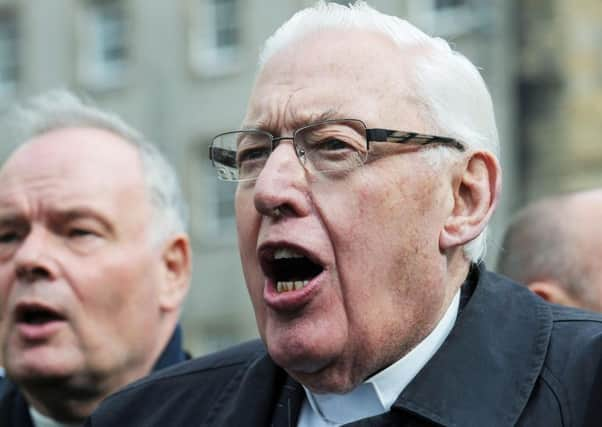Ian Paisley opposed man linked to secular economic body, thinking it was Catholic


Sir Ninian Stephen, who died last year aged 94, had been chosen to chair the first talks between unionists and nationalists as well as the British and Irish governments since the unionist boycott in response to the 1985 Anglo Irish Agreement.
With the Troubles continuing and the IRA’s political representatives not admitted to the talks, the initiative, which began in July 1992, ultimately failed to reach any resolution to the long impasse.
Advertisement
Hide AdAdvertisement
Hide AdBut a file declassified at the Public Record Office in Belfast under the 20 Year Rule suggests that the DUP leader spent considerable time arguing about the choice of talks chairman out of the mistaken belief that he was linked to the Roman Catholic Church which Dr Paisley so vehemently opposed.
There had been protracted debate about Sir Ninian’s suitability for the role and on June 15, 1991, Dr Paisley said in an ITN interview that his party had not yet finalised its decision on the issue but would have a clear position the following week “because on Monday we will have all our investigations done; we’re just waiting for a report - a long report - from Australia, and we’re awaiting a report from an academic”.
A previously confidential Northern Ireland Office minute shows that six months later, on December 19, 1991, Dr Paisley raised the issue during a meeting with the secretary of state and UUP leader Jim Molyneaux.
The DUP leader repeatedly expressed opposition to Sir Ninian’s appointment, telling the secretary of state that “he would not have Sir Ninian Stephen as chairman”.
Advertisement
Hide AdAdvertisement
Hide AdHe went on to say that “Sir Ninian Stephen had held political office and was a member of the Club of Rome”.
Seemingly bemused at that objection, the secretary of state responded that “Sir Ninian Stephen had been a representative of the Queen.
“The Club of Rome believed in zero economic growth, but had nothing to do with a church.”
The Club of Rome is an economic organisation - which takes its name from the Italian capital because that was where in 1968 its first meeting was held - which argues for zero economic growth as an antidote to the environmental crisis because economic growth could not continue indefinitely without depleting the earth’s finite resources.
Advertisement
Hide AdAdvertisement
Hide AdFar from being linked to the Roman Catholic Church, the Church has been wary of one of its central arguments - that the world is overpopulated - because addressing that would almost certainly involve birth control.
Sir Ninian was in fact an Anglican.
Dr Paisley’s claim that Sir Ninian had not been a judge was also incorrect.
Four days later, Dr Paisley’s deputy leader, Peter Robinson, spoke to NIO official Danny McNeill.
A confidential memo from Mr McNeill relayed the contents of their conversation.
Advertisement
Hide AdAdvertisement
Hide AdIn it, the civil servant said that he had asked Mr Robinson why Dr Paisley opposed Sir Ninian as a talks chair and recorded. He recorded that the DUP man then turned the question back on him: “Robinson asked me if I knew precisely why Paisley was objecting to Sir Ninian. I said not.
“I said that the only things mentioned were the media interviews and the fact that Sir Ninian is or had been involved with the Club of Rome.
“I also said that Paisley said there were other things wrong with Sir Ninian but would not spell them out.
“Finally, I said that Paisley seemed to be badly informed in that he had said that Sir Ninian was a politician.”
Advertisement
Hide AdAdvertisement
Hide AdMr McNeill went on to say: “Robinson said that he did not know what Paisley had against Sir Ninian. All he knew was that Paisley had asked the Orange Order in Australia to research Sir Ninian but he (Robinson) had not been told what the Order had reported.
“Robinson clearly has no problem with Sir Ninian and he undertook to have a word with Paisley about the matter over Christmas.”
Ultimately, Dr Paisley entered the talks under Sir Ninian’s chairmanship and after the process had ended he praised the Australian diplomat’s handling of the negotiations.